Overview
This article delves into the substantial physical and psychological transformations that accompany a 20-pound weight loss, highlighting its profound benefits on overall wellness and workplace productivity. It illustrates how shedding excess weight can lead to:
- Improved mobility
- Heightened self-esteem
- Decreased risk of chronic diseases
These factors collectively contribute to a healthier, more engaged workforce, particularly through tailored corporate wellness programs designed to meet the unique needs of employees. By addressing the challenges faced by HR Benefits Managers, this article underscores the importance of implementing effective wellness initiatives that not only enhance individual health but also foster a more productive work environment.
Introduction
In the modern workplace, the significance of weight loss extends far beyond mere appearance; it plays a pivotal role in enhancing overall employee well-being and productivity. As organizations increasingly recognize the link between health and performance, the implementation of effective weight management strategies has become essential. Consider the following benefits:
- Reducing the risk of chronic diseases
- Boosting morale
- Enhancing team cohesion
The benefits of weight loss initiatives are profound. This article delves into various aspects of weight management, including the physical and psychological transformations that accompany weight loss, the impact of anti-obesity medications, and the importance of sustainable lifestyle changes. By exploring these themes, it becomes clear that fostering a culture of health not only nurtures individual employees but also propels organizations toward greater success.
Understanding the Importance of Weight Loss in Wellness
Weight loss transcends personal aesthetics, offering profound benefits that resonate within the workplace. Research indicates that even a modest decrease in mass can significantly lower the risk of chronic illnesses, including diabetes, heart disease, and hypertension. These wellness improvements not only enhance individual well-being but also foster a more dynamic and productive work environment.
Improved mobility, reduced joint discomfort, and heightened energy levels contribute to a more active lifestyle, which is crucial for sustaining high performance at work.
At Foresight Health Coaching, we understand that promoting weight loss among employees is not just a wellness initiative; it is a strategic investment in productivity and team cohesion. Our customized corporate health programs are designed to enhance employee health, productivity, and cognitive performance through individualized support and exercise. These programs include personalized coaching, fitness assessments, and nutrition guidance tailored to meet the specific needs of your team.
Studies indicate that companies with effective workplace health programs, like those we offer, see a marked increase in employee productivity and a decrease in absenteeism. Indeed, organizations that emphasize fat reduction and overall health report greater employee satisfaction and engagement levels, fostering a more cohesive team environment.
As we approach 2025, the data related to workplace health initiatives show an increasing acknowledgment of the significance of fat reduction in decreasing chronic disease risk. The obesity sector is anticipated to experience considerable advancements, with changing views on reducing mass and its significance in workplace health. Effective corporate well-being programs that encourage shedding pounds, such as our collaborations with various companies, have shown concrete outcomes, particularly in illustrating what does 20 pounds of weight loss look like and highlighting the direct link between employee well-being and organizational achievement.
For example, a collaboration between Lilly and Health Innovation Manchester is examining the real-world effectiveness of strategies for reducing body mass, which will yield valuable insights into outcomes. Furthermore, it is essential to acknowledge that self-reported height and mass often underestimate obesity prevalence, emphasizing the necessity for precise evaluations in workplace programs. By incorporating slimming strategies into our wellness initiatives, companies can foster a healthier workforce, which leads to the important question of what does 20 pounds of weight loss look like, ultimately resulting in improved performance and a more robust team culture.
Foresight Health Coaching is committed to transforming company cultures and empowering employees to live their healthiest, most productive lives. Our programs not only aim to reduce absenteeism and lower healthcare costs but also foster a culture of health that attracts top talent and enhances overall employee satisfaction.
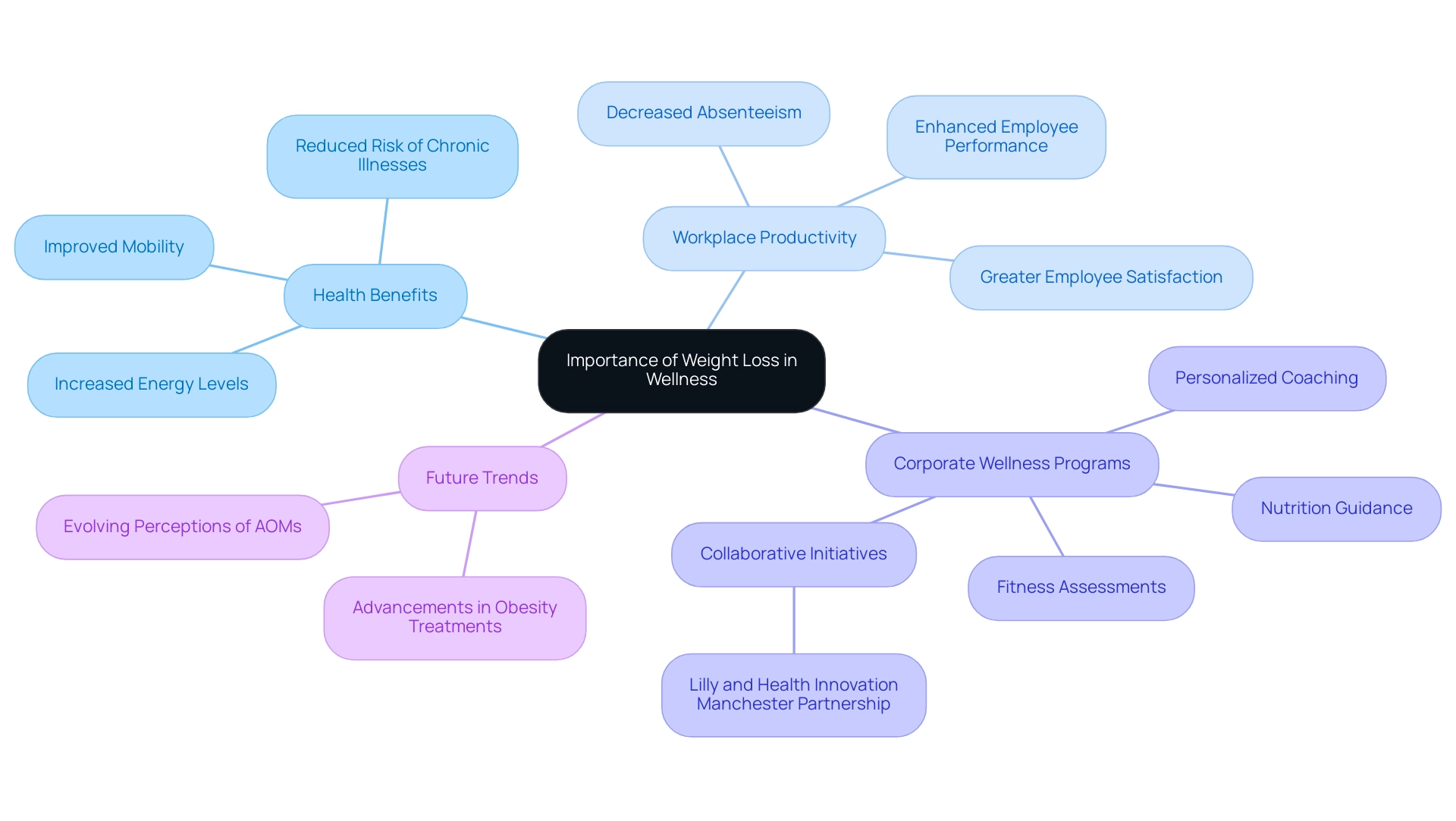
Physical Changes: What 20 Pounds of Weight Loss Looks Like
What does 20 pounds of weight loss look like? This transformation can lead to significant and visible physical changes that vary among individuals. Common indicators of a 20-pound weight loss include:
- A noticeable reduction in body fat
- Improved muscle definition
- A more toned physique
Many individuals find that their clothes fit more comfortably, which often enhances their confidence and self-esteem.
Moreover, a reduction in body mass can improve posture and lessen strain on the body, particularly in the joints. For instance, an individual weighing 200 pounds may discover that losing 20 pounds not only enhances their appearance but also makes daily activities—such as walking, climbing stairs, and exercising—much easier and more enjoyable.
Visual representations of these changes serve as powerful motivators for those embarking on a body transformation journey. Research indicates that individuals who achieve a 25-pound weight loss experience nearly a 10% decrease in their initial mass, significantly impacting their overall health and well-being. In 2025, data reveals that many individuals are curious about what 20 pounds of weight loss looks like, as those who accomplish this goal typically report improved body fat reduction and muscle definition, resulting in a healthier body composition.
Expert insights underscore the importance of these changes, with many noting that the psychological benefits of shedding excess pounds—such as increased motivation and engagement—are just as crucial as the physical improvements. As one doctor aptly stated, "I know it’s not easy, but I can’t help you unless you’re willing to help yourself. You just need to work harder and take control of this again."
Real-life examples of body transformations among employees vividly illustrate what 20 pounds of weight loss looks like and the profound impact it can have on both personal and professional lives. These transformations not only enhance individual wellness but also foster a more cohesive and productive team environment, aligning with Corporate Membership - Contact Our Health Coaches Today's mission to promote a healthier, happier, and more unified team culture through personalized coaching and community support.
Furthermore, it is essential to acknowledge the complexities of body reduction research. A recent study titled 'Limitations and Future Directions in Weight Reduction Research' highlighted the need for caution in generalizing findings, suggesting that future studies should incorporate modern web-based interventions, such as Foresight Coaching's transformative coaching app, to improve the effectiveness of reduction programs. This emphasizes the importance of tailored approaches in achieving successful weight loss outcomes, supported by skilled coaches utilizing evidence-based techniques and a comprehensive wellness coaching platform that offers personalized workouts, nutrition guidance, and daily programming for effectively reaching health goals.
Testimonials from clients who have successfully lost weight using the app further validate its effectiveness, showcasing how features like direct messaging with coaches and community support play a crucial role in their journey.
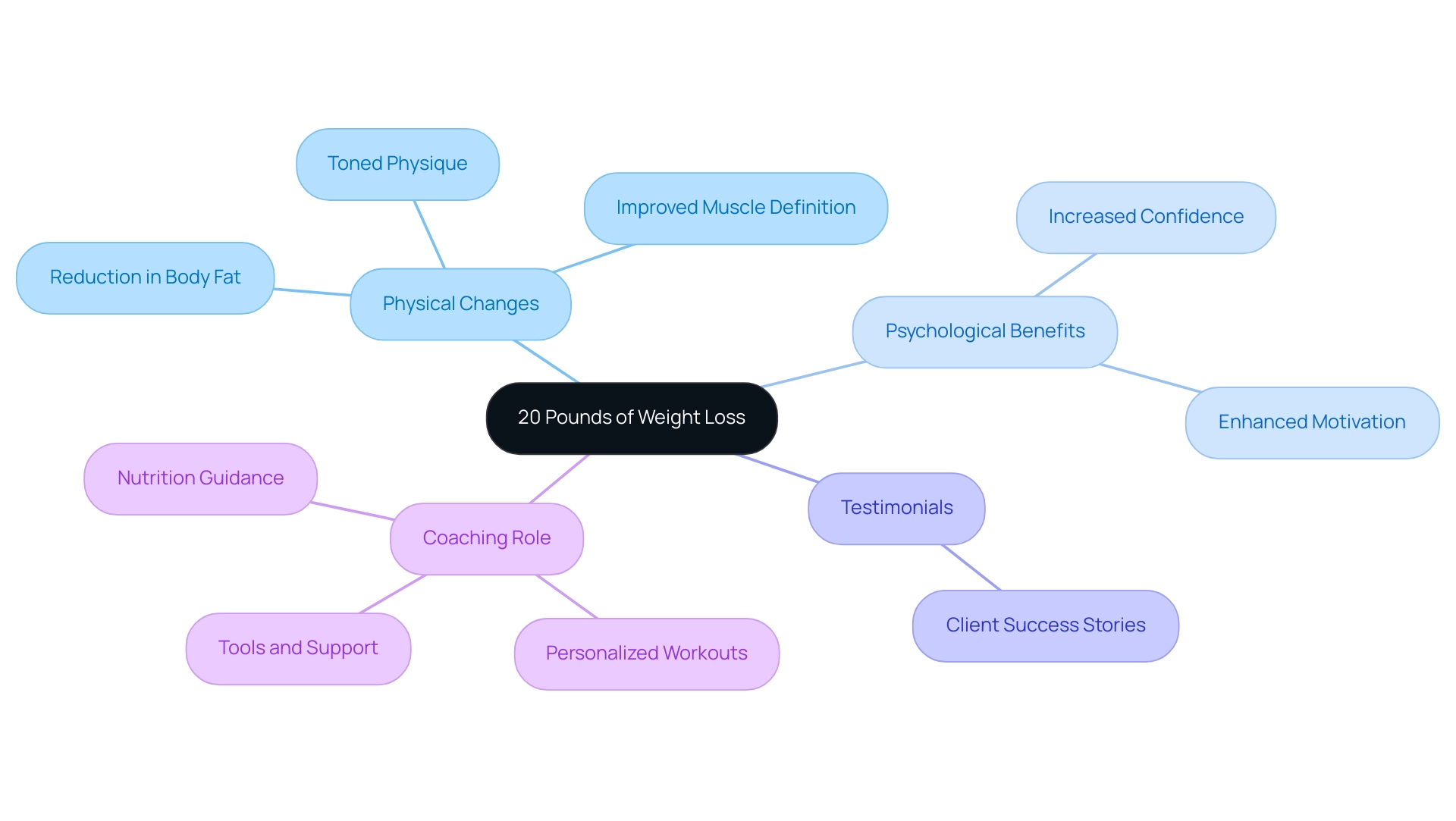
The Psychological Benefits of Losing Weight
The psychological advantages of shedding excess pounds, such as understanding what does 20 pounds of weight loss look like, are profound and multifaceted, significantly impacting individuals' overall well-being. Studies indicate that reducing body mass can result in significant enhancements in mood, self-worth, and psychological well-being. For instance, individuals who attain a reduction in body mass often experience a decrease in symptoms of anxiety and depression, alongside improved cognitive function.
This transformation extends beyond the physical realm; understanding what does 20 pounds of weight loss look like on this journey fosters a sense of achievement and empowerment, significantly enhancing self-image.
Customized coaching plays an essential role in this process, as skilled mentors employ evidence-based methods to assist individuals in their fitness journeys. Regular physical activity, a crucial element of shedding pounds, is enhanced through this personalized support, leading to improved emotional well-being. Engaging in exercise releases endorphins—commonly known as 'feel-good' hormones—which contribute to a more positive outlook.
Current research highlights that individuals who incorporate regular exercise into their routines report higher levels of motivation and engagement at work. This is especially significant in business environments, where the mental advantages of shedding pounds can lead to enhanced productivity and job satisfaction.
Furthermore, case studies demonstrate that organizations promoting weight loss initiatives among employees observe notable enhancements in workplace morale and mental well-being. For example, a comprehensive program encouraging physical activity and healthy eating, backed by personalized coaching, can lead to a more cohesive team environment, ultimately enhancing overall performance. As highlighted in a study, the majority of research (77%) had follow-up periods of 12 months or less, emphasizing the importance of long-term care and programs for effective management of body mass.
Additionally, as Segal Y. states, "Overall, this plays a crucial role in prevention, early intervention, and successful management of obesity-related psychological effects, leading to improved health outcomes and quality of life." This underscores the critical nature of addressing psychological aspects in weight loss. Furthermore, pharmacological and surgical interventions, such as sleeve gastrectomy, gastric bypass, and adjustable gastric band, are increasingly utilized for managing body mass, particularly for individuals who have not succeeded with lifestyle changes alone.
As such, understanding what does 20 pounds of weight loss look like is as much about mental transformation as it is about physical change, making it a vital consideration for organizations aiming to foster a healthier, more productive workforce.
To hear how our personalized coaching has made an impact, consider the words of one of our clients: "With the support of my coach, I not only shed pounds but also gained confidence and a new perspective on life!" Contact us today to start your journey towards a healthier you!
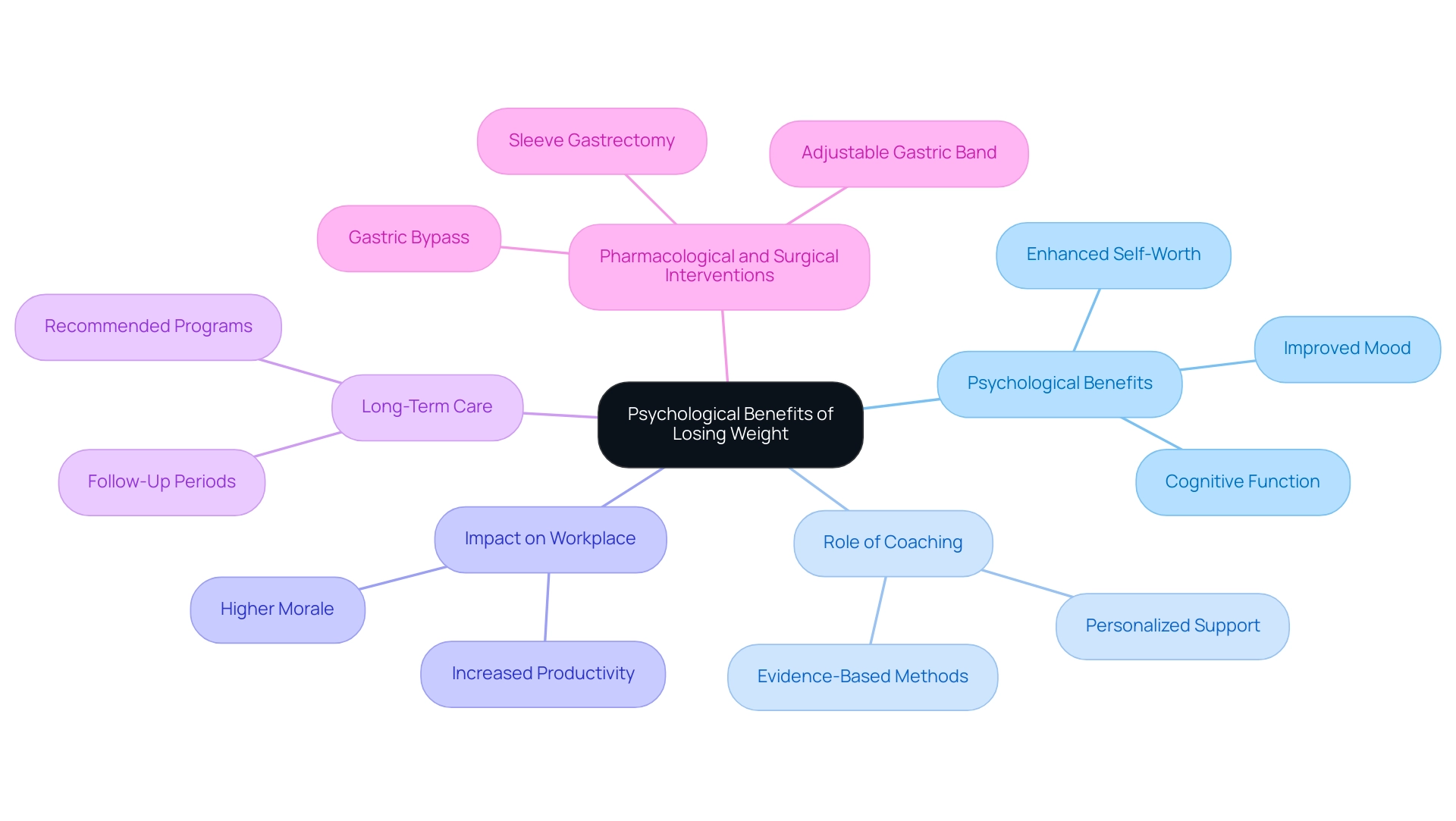
Medical Interventions: The Role of Anti-Obesity Medications
Anti-obesity medications are increasingly recognized as a vital component in the management strategies for individuals who struggle to achieve weight reduction through diet and exercise alone. These medications operate by suppressing appetite, enhancing feelings of fullness, or decreasing fat absorption. Notably, medications such as orlistat and GLP-1 receptor agonists have demonstrated considerable effectiveness in facilitating reductions in body mass, particularly when integrated with lifestyle modifications.
Data from 2025 indicates that individuals utilizing anti-obesity drugs in conjunction with behavioral strategies can achieve an average decrease of 5-10% in body mass within the first year, as evidenced by initiatives like Look AHEAD and the Diabetes Prevention Program. This underscores the potential of these medications to augment traditional weight loss methods.
Experts emphasize that while anti-obesity medications can significantly aid in weight loss, their effectiveness is maximized when combined with sustainable lifestyle changes, including a balanced diet and regular physical activity. A recent case study on Foresight Health Coaching's corporate health partnership illustrates how customized health programs, which incorporate medication management, can enhance employee performance, creativity, and stress management. Organizations that invest in such comprehensive approaches not only foster a healthier workforce but also cultivate a more cohesive team culture.
Furthermore, current data on appetite suppression medications reflects a growing acceptance of their role in weight management, particularly within workplace health initiatives. As the competitive landscape of the anti-obesity medication market evolves, it becomes imperative for individuals to consult healthcare professionals to develop the most appropriate treatment plans tailored to their unique medical profiles. This collaborative approach ensures that medications serve as a supportive resource within the broader context of well-being.
As Grace Halsey notes, guidance on this subject should be regarded as recommendations unless specific regulatory or statutory requirements are cited, emphasizing the importance of informed decision-making in the utilization of these medications. Additionally, healthcare systems are increasingly confronted by rising obesity rates, making it essential for organizations to consider the integration of anti-obesity medications within their wellness strategies. This not only addresses individual health needs but also contributes to a more productive and engaged workforce.
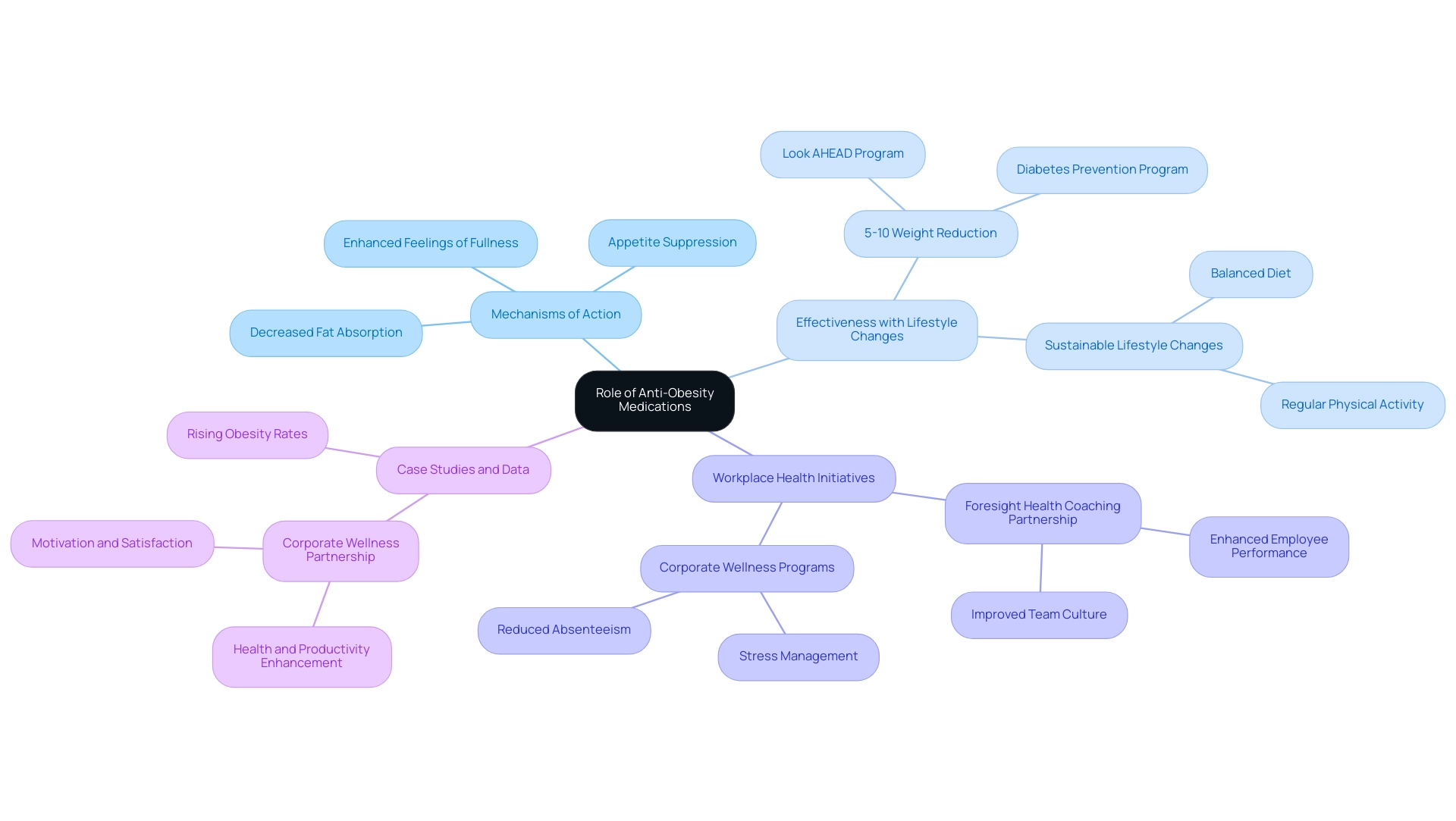
Sustaining Weight Loss: The Importance of Lifestyle Changes
Maintaining a reduction in body mass relies on a strong dedication to enduring lifestyle modifications rather than short-term diets. Essential strategies include:
- Adopting a balanced diet that emphasizes whole foods
- Engaging in regular physical activity
- Developing healthy coping mechanisms for stress management
Studies show that individuals who effectively sustain their reduction in body mass frequently mention making lasting changes to their dietary practices and workout routines.
For instance, research indicates that those who include at least 30 minutes of exercise three times a week are more likely to maintain their weight loss and report higher motivation levels at work.
Conversely, very-low-calorie diets (VLCDs), which can lead to weight losses of approximately 15 to 30 kg over 12 to 20 weeks, may not yield sustainable results, as many individuals regain weight after ceasing the diet. Setting realistic goals and diligently tracking progress are vital components in maintaining motivation and accountability. Furthermore, support from peers, family, or workplace wellness programs, such as those offered by Foresight Health Coaching, can significantly enhance the likelihood of sustaining these changes.
Such support fosters a sense of community and shared commitment to health, which is crucial for long-term success.
Dr. Richard Joseph emphasizes the significance of organized lifestyle changes, stating that "sustainable loss is achieved through consistent, healthy habits rather than quick fixes." In 2025, statistics show that individuals who participate in organized lifestyle changes, such as those provided through corporate health partnerships with Foresight Health Coaching, experience better outcomes in weight maintenance. For instance, organizations that invest in customized health programs not only enhance employee performance and creativity but also contribute to a reduction in absenteeism and presenteeism.
Foresight Health Coaching's corporate memberships offer extensive services, including in-person sessions, nutritional advice, and access to our fitness app, which improves connectivity and support among employees. This holistic approach to health highlights the significance of lifestyle changes in achieving sustainable weight loss and overall well-being. Foresight Health Coaching's corporate partnership exemplifies how investing in employee wellness can lead to a healthier, more cohesive team culture.
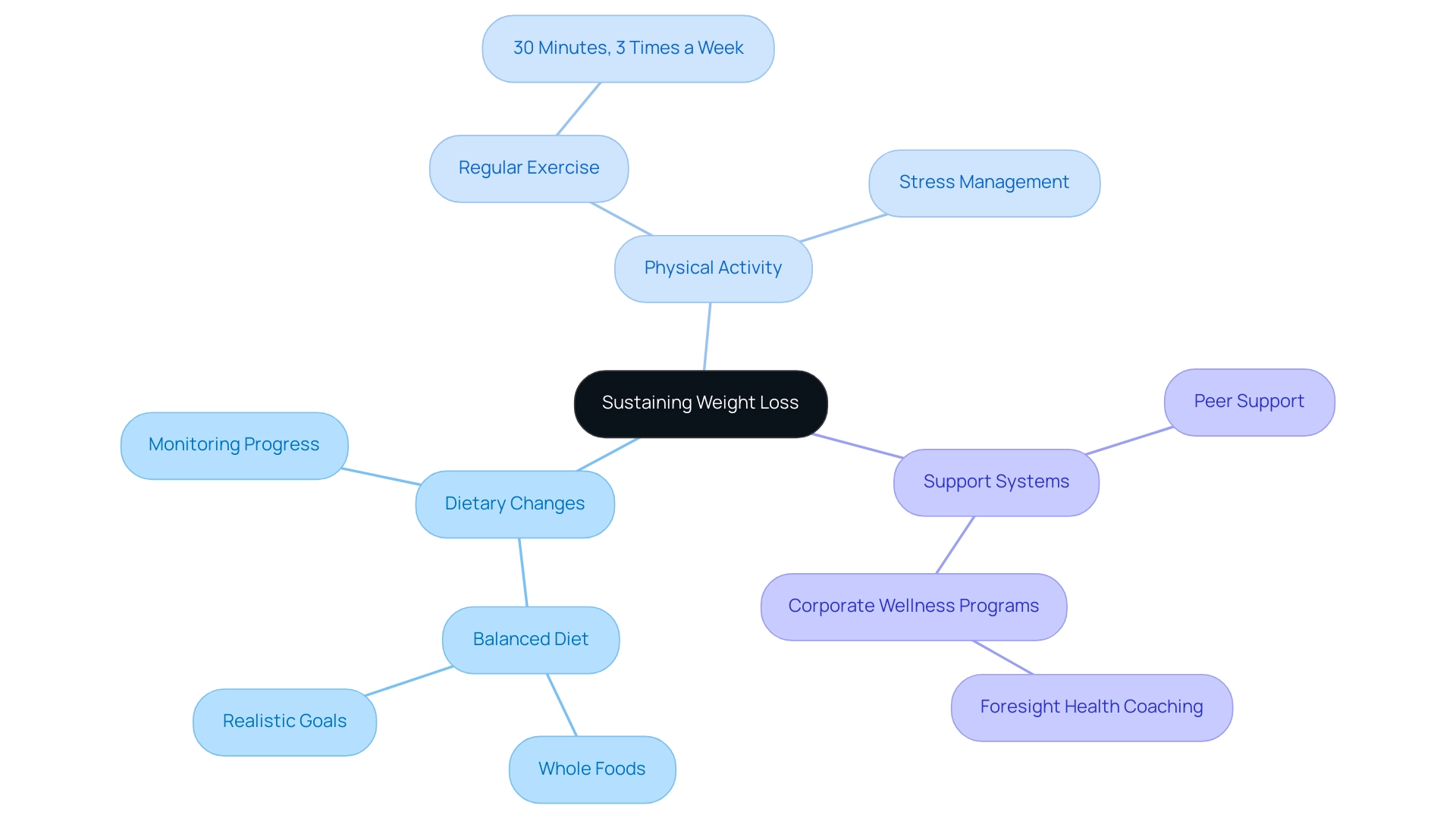
Enhancing Workplace Wellness Through Weight Management
Introducing management programs for body mass in the workplace offers substantial advantages for both employees and organizations. Healthy employees are generally more productive, experience fewer sick days, and contribute positively to the work environment. Programs that promote physical activity and healthy eating, along with illustrating what a 20-pound weight loss looks like, enhance individual well-being, foster team cohesion, and improve morale.
For instance, organizations that have embraced comprehensive well-being initiatives, such as those provided by Foresight Health Coaching, report significant enhancements in employee engagement and productivity due to customized corporate programs tailored to the distinct needs of various businesses.
Foresight Health Coaching's corporate initiatives are specifically designed to cultivate a culture of well-being within organizations, aligning personal well-being objectives with mutual success. By investing in employee well-being, companies can enhance overall performance, reduce healthcare costs, and create a more engaged workforce. Recent information indicates that organizations adopting management initiatives can observe a notable decline in absenteeism and presenteeism, with employees experiencing neck and back discomfort being 79% more prone to high presenteeism than their healthier peers.
Additionally, research indicates that successful workplace health programs can lead to a decrease in healthcare costs, with an estimated yearly loss of $81 billion attributed to substance use in the workplace. This underscores the critical need for organizations to prioritize employee well-being. As Grace Smith pointed out, in 2017, 41% of companies established wellness programs specifically aimed at chronic disease management, highlighting an increasing acknowledgment of the significance of such initiatives.
As we progress through 2025, the focus on workplace wellness programs centered on managing body mass continues to expand. Numerous organizations recognize the direct link between employee well-being and productivity. Successful case studies, such as those showcasing Foresight Health Coaching's partnerships with top firms, demonstrate that fostering an environment of support, recognition, and trust can significantly boost employee confidence, leading to increased innovation and engagement. By implementing targeted weight management initiatives, organizations not only improve the health of their employees but also help them understand what a 20-pound weight loss looks like, thereby enhancing overall productivity and workplace satisfaction.
The logos of our partner firms prominently displayed in our materials serve as a testament to our credibility and the successful collaborations we have established. Testimonials from satisfied clients further reinforce the effectiveness of our programs, showcasing real-world impacts on employee well-being and organizational success.
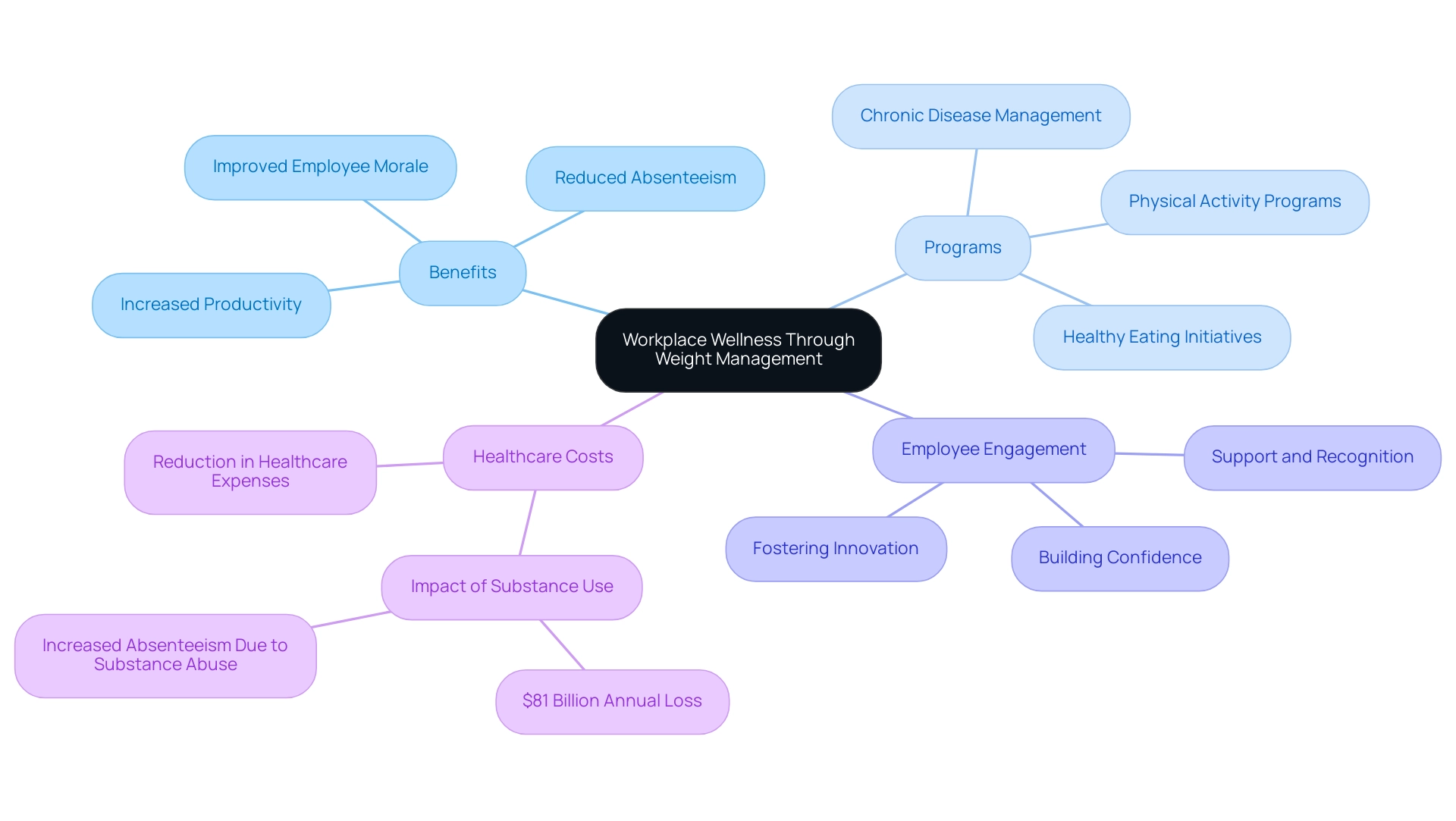
Conclusion
The exploration of weight loss in the workplace underscores its vital role in enhancing employee well-being and organizational productivity. Achieving even modest weight reductions can significantly lower the risk of chronic diseases, boost morale, and foster team cohesion. Tailored corporate wellness programs, like those offered by Foresight Health Coaching, not only provide individualized support but also create a culture of health that benefits both employees and employers alike.
The physical and psychological transformations that accompany weight loss are profound, leading to improved self-esteem, mood, and cognitive function. Moreover, the integration of anti-obesity medications alongside sustainable lifestyle changes presents a comprehensive approach to weight management, further amplifying the positive outcomes for both individuals and organizations. The commitment to long-term lifestyle adjustments is crucial for maintaining weight loss and enhancing overall well-being.
Ultimately, organizations that prioritize weight management initiatives can expect not only a healthier workforce but also a more engaged and productive team. As the emphasis on workplace wellness continues to grow, investing in employee health through effective weight loss strategies will be essential for fostering a thriving work environment. By nurturing a culture of health, businesses can pave the way for sustained success, benefiting both their employees and their bottom line.




